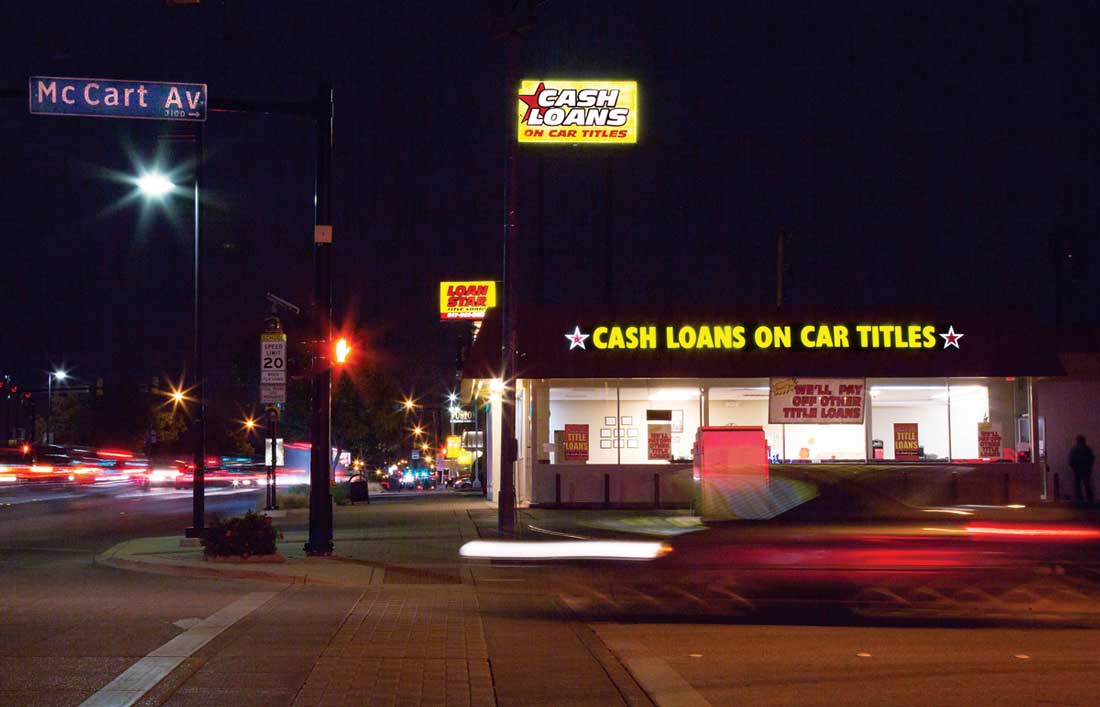Stymied by the legislature’s lack of action, 21 cities across Texas have passed an agreed-upon ordinance to stop some of the worst excesses of the payday lending industry.
The only major city not to pass the ordinance? That would be Fort Worth, which — coincidentally or not — is headquarters for Cash America, one of the biggest players in the payday industry.
In the meantime, borrowers in Texas are paying some of the highest interest rates and loan fees in the country. And a major faith-based charitable group says that payday loans, with interest rates of up to 500 percent, are now cited by more than a third of the charity’s clients as the problem that drove them into financial crisis.
The Fort Worth City Council turned down the unified ordinance in May, citing, among other things, the possibility that the ordinance might get the city sued. The Fort Worth Star-Telegram quoted Mayor Betsy Price as warning about the need to guard against “having a knee-jerk reaction” and worried that such an ordinance would interfere with market-driven activity.
Since then, lawsuits against the ordinance have failed in Dallas and San Antonio. Most recently, an appellate court in Dallas rejected arguments by the industry that the ordinance prevents them from doing business.
Those results apparently haven’t changed any minds at city hall here. Neither the mayor nor any current member of the council would return calls or provide comments on the issue.
The only response was a two-sentence e-mail from a city spokesperson, saying that the council “has no current plans to pursue any kind of action regarding payday loans.”
In 2010, then-city council member Kathleen Hicks attempted to stop the influx of payday-loan storefronts but got nowhere. Hers was the lone vote on the council against a rule change that effectively loosened zoning restrictions against such storefronts.
“We were told that we couldn’t do anything, that we would be sued. There are a number of corporations that are in the Metroplex — they have a lot of power,” she said. “I think I paid a political price for trying to do the right thing.”
Hicks said she understands the need for short-term loans when people are hit with unexpected financial emergencies like medical bills. But she said she has heard too many heartbreaking stories of people getting caught in a cycle of debt that overwhelms them.
“I don’t know why Fort Worth won’t do the right thing,” she said.
In Dallas, city council member Jerry Allen took up the fight for payday loan regulation after legislative attempts to regulate the industry failed in 2011 and 2013.
“Government is to protect the people. If the state won’t do it, we will have to do it at the local level,” Allen said. “So far the court of law has stood behind us as has the court of public opinion. Our citizens pay the highest [payday lending] rates in America.”
Representatives of the payday industry say that their loans fill a need for consumers and that the local ordinances are only symbolic gestures. But Robert Norcross of the Consumer Services Alliance, which represents the payday industry, also said that the bigger companies are complying with the ordinances.
Texas is a favorite state for payday and auto-title lenders because it places almost no limits on fees, loan amounts, or “rollovers.” The latter is the industry term for giving lenders longer than the originally agreed time period to pay off short-term loans but at huge costs. A small loan can balloon to amounts that keep the borrowers in perpetual debt.
The unified ordinance restricts the amount of a payday loan to 20 percent of the borrower’s gross monthly income, or 3 percent of gross annual income for auto- title loans. It sets the maximum number of payments on a loan at four, including rollovers. And it requires that 25 percent of each payment be applied to the principal.
“Texas has some of the highest charges in the country,” said Ann Baddour, senior policy analyst at Texas Appleseed, a nonprofit advocacy group that has been beating the drum for the ordinance. “If Fort Worth joined the growing list of Texas cities passing the unified ordinance, it would offer important support to the powerful city message that uncapped payday and auto-title loans, often at 500 percent … annual percentage rate or higher, are hurting Texas families and local economies.
“The time has come to tackle this problem, and the city ordinance movement is a strong step forward in the push to rein in market abuses,” she said.
Beginning in the 1990s, payday lenders found a way to get around the state’s usury laws. They began registering as “credit access businesses,” or CABs. In about the last decade, the number of payday and title-loan storefronts in the state has shot up from about 250 to 3,400.
In surveys conducted in 2010 and 2012, the Texas Catholic Conference found a major increase in Texas families’ requests for assistance from local charities.
“Basically, what we discovered was that [in 2010] about 20 percent of our clients were getting assistance because of payday loans. That number jumped to 36 percent in 2012,” said Jennifer Carr Allmon, associate director of the Texas Catholic Conference.
The conference has organized a group, Texas Catholics for Fair Lending, and held a payday-lending “road show” to educate people about the payday-lending industry and the pitfalls of taking out payday loans.
A leader in the fight against payday regulation has been Sate Rep. Gary Elkins, a Houston Republican who also owns a dozen payday-lending stores. Elkins’ businesses have been blatant in their disregard of the ordinances and as a result have been cited in Dallas, Houston, and San Antonio for failing to register with the cities and not allowing inspections of their records.
“At the end of the day, you’ve got a lawmaker making laws for people except when it comes to himself,” Allen said. The Dallas council member has been a driving force behind the city ordinances.
If, as the lending industry says, the unified ordinance is just symbolic, Allen said, “Ask Gary Elkins about his court date.”
Norcross said that payday loans are sometimes the only alternative for people who have bad credit. His group represents 17 companies that operate 3,000 payday- lending stores in Texas. The rest are owned by much smaller companies.
He said the ordinance doesn’t keep consumers from borrowing but just causes them to turn to the internet to find loans or to drive to other cities.
“It’s like a gas tax, having to drive further for a payday loan,” he joked.
His group has proposed its own version of regulations, including limiting the numbers of rollovers and, when borrowers get into trouble, reducing fees and dividing payments into smaller amounts
Both sides in the debate say they’d rather have statewide legislation, but there’s no indication that that will happen when the legislature convenes in January.
For payday critics, the recent court decisions were important gains.
“The Dallas appeals court outcome was … a huge step forward in the movement,” Baddour said, She has hopes that Texas can move toward “a viable lending market … that promotes success for borrowers and curtails the harmful practices.”
Allen said that poor people with few assets who need a loan find better deals in cities that have passed the ordinance.
“Good things come from dealing with good people who do the right thing. … This is the right thing,” he said.













Very poorly written article. If Jerry Allen was smart, he would visit the Texas OCCC website and see that 500% is not the average in Texas. In fact it is much lower than that. Additionally, he will see that on average, the loans are paid off our closed with in 3 months. So with that said, no one is really earning 500% a year on these loans. Jerry Allen and the rest of the advocate groups rely on studies done by biased groups such as the Pew Trust who use your tax dollars to do inaccurate studies that portray the payday loan industry as vandals. The fact is, that the actual and real numbers are available on the Texas OCCC website. Jerry Allen and his crew do not want to use the real statistics of payday loan consumers in Texas cause it would debunk all of his theories and comments in this article.
If you really want to protect people why don’t they ban alcohol and tobacco. Last time I checked, a payday loan did not kill anyone. In fact, a bank overdraft fee of 34 dollars to get 20 dollars is equivalent to about 6000% APR. Why doesn’t Jerry mess with the big banks? Probably because he is scared. So he picks on mom and pop owned payday loan stores… Wow! Way to go Jerry!
Let me know how many mom and pop payday loan operators you see with leer jets in their backyards… Uhh, I can answer that for you, None.
The reason these loans cost more than a credit card or a regular loan at the bank is they are short term, for a small amount of money (normally less than 500 bucks), they do not require great credit and they have a very high default rate.
If Jerry or any of these groups that are aligned with him think that these loans are so bad, why don’t they lend out their own money (not ours) to everyone at Zero Percent interest. The answer is they won’t. Meaning they really do not care about the people, they figure this is an easy industry to attack and get them a little publicity in the political arena to stay in office… Be a real man Jerry and lend out your own money? The people are waiting… So far your all talk, no action.
Careful there buddy, doing too much research on these articles will make the authors of the articles respond to you and accuse you of working for big companies…. They always do that whenever someone has more evidence than them… It’s entertaining to see which excuse they’ll throw out at people next.
Great job Cohe. Glad to see the story finally make it out. These businesses are a predatory blight on our great city.